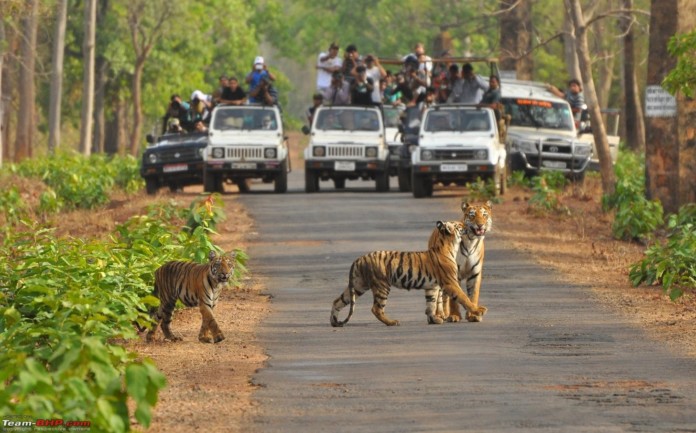India’s eco-tourism policies are too heavily tilted towards managing tiger reserves. This has clearly affected the development and growth of eco-tourism as a complete experience. In fact, it has been affecting tigers too as people disturb them while trying to get a glimpse. “There’s too much stress on large mammals (like elephants, rhinos & tigers). The challenge for us is how to move away from this focus,” Vinay Luthra, chairman of the Karnataka Tourism Board observed.
What a robust eco-tourism policy should look like – was the topic of the workshop at IIM Bangalore in February 2017. It was put together by Dharthi and SustainabilityNext in collaboration with IIMB (Centre for Corporate Governance & Citizenship.) The participants represented different stakeholders – forest department officials, tourism board members, resort owners, community-run resorts, NGOs and academia.
It’s surprising that India and most of its state governments, with the exceptions of Kerala, Himachal Pradesh and Madhya Pradesh, are yet to announce a comprehensive eco-tourism policy. Karnataka was a pioneer when it announced its ‘Wilderness Tourism Policy’ a decade ago. The state is known to have drafted an eco-tourism policy as well recently, but a few contentious issues and vested interests are said to holding back from announcing it.
It’s ironical that India has an eco-tourism policy only for 0.7% of the forest area which are tiger habitats. There’s no policy for rest of the forest. Fortunately, Myecotrip (www.myecotrip.com) offers a variety of activities around nature across the state. The government is planning to launch an app soon to ensure the process of travel smoother.
Dr. A K Bhattacharya, former CEO, MP Eco-tourism Development Board said all tourism is ‘eco-tourism’ and care has to be taken to protect and nurture ecology around all tourist destinations. He called for a 10-year vision or a road map for eco-tourism, for it to have any lasting impact. Eco-tourism should be repositioned as a pilgrimage to forest.
The draft of The Karnataka Tourism Policy 2014-19 does mention eco-tourism in passing. It states, “Eco Tourism will be promoted as a core tourism activity in close collaboration with the Forest Department. An eco-tourism zone stretching from Coorg to Karwar will be identified and a chain of nature camps will be encouraged and promoted as Jungle Trails in the zone.”
The stakeholders at the workshop want much more from the state’s eco-tourism policy. Some
suggestions include:
- A clear policy which includes certification and ratings for home-stays and resorts
- A governance structure that penalizes service providers and officials for laxity and connivance
- Address the issue of monopoly of state-owned Jungle Lodges over safaris
- Eco-tourism has become an elite activity and that affordable services should be widely built
- Incentives for training naturalists and for community-run home-stays or resorts
The language of the state’s draft tourism policy appears to be in sync with the times and has used the stake-holder friendly language. It states: “We acknowledge that the tourism sector is strongly supported by micro-enterprise activities and hence the policy encourages creating an enabling environment for local tourism industry (SME) to operate in an ecologically and environmentally sustainable manner.”
“The Policy encourages shift in attitudes – from regulation and control to empowerment, from patronage to partnership, and from linear government-lead structures to alliances with diverse stakeholders in the sector.”
Responsible Tourism
Jose Dominic, MD & CEO, CGH Earth, one of the most successful ventures in eco-tourism in India believes ‘responsible tourism’ concept is better than ‘eco-tourism’ if the larger interest is to protect the ecology, the communities at the same time provide rich experience to customers. His success mantras are:
- Profit and eco-tourism are not contradictory
- ‘Show what there is’. Even mud and thatch can be luxury
- Customer interest is only next to that of the environment and community
Clearly there’s a huge mismatch between potential revenue earning capability of tourism, particularly eco-tourism in Karnataka, to the earnings today. The ecological diversity in Karnataka is one of the best in India. But what is needed, George Ramapuram of Orange County, said, is a big picture approach.
Read draft tourism policy : http://www.bcic.in/wp-content/uploads/2014/04/Draft-Karnataka-Tourism-Policy-2014-19.pdf










